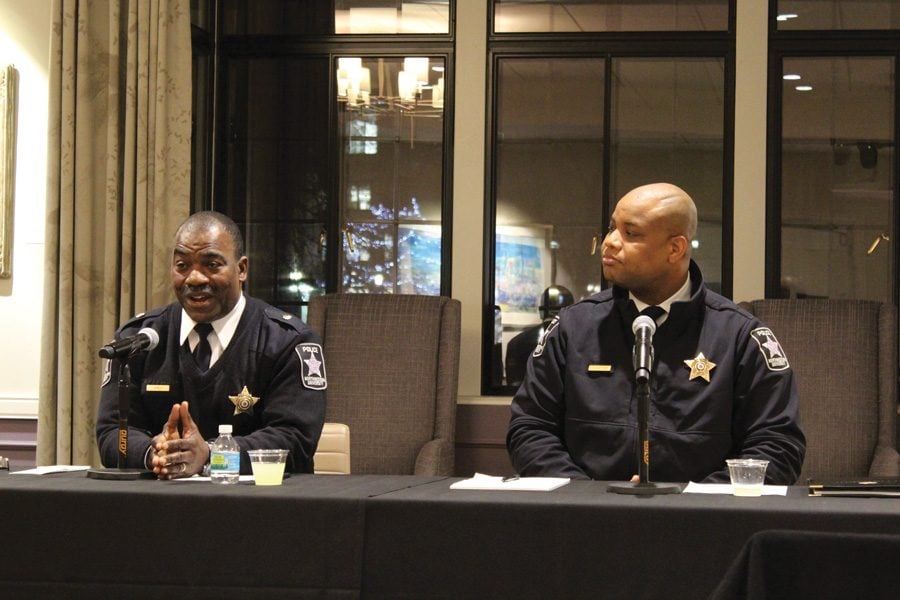University Police discuss Black Lives Matter at panel
Linnea Narducci/The Daily Northwestern
University Police officers Tommye Sutton and Kenneth Jones speak at a panel on the role of police in the Black Lives Matter movement. The event was part of Black Lives Matter, a Northwestern Dialogue.
January 13, 2017
Being a police officer is not antithetical to supporting Black Lives Matter, University Police officers said Thursday at a panel discussing how race relations affect their work.
In a gathering of 15 attendees in the Guild Lounge, Tommye Sutton, deputy chief of police, and Kenneth Jones, commander of police services at Northwestern’s Chicago campus, spoke about navigating being black men and police officers. UP and the Office of Multicultural Student Affairs co-hosted the event.
The event was part of Black Lives Matter, a Northwestern Dialogue, which is a student-led and administrator-backed series lasting two weeks on the Black Lives Matter movement and the state of black lives in the United States.
Sutton approached MSA director Charles Kellom in the fall with the idea for the event.
“We need to engage people to let them know we care about them, to educate them on the systems that are here in place to ensure they’re safe and answer any questions they may have,” Sutton told The Daily.
During Thursday’s event, Sutton and Jones discussed ways to combat prejudice within the police system. A key component in stopping violence on the streets is educating people, Sutton said. In his experience, many people lash out against the police out of frustration, he said.
“When I think Black Lives Matter, I look to the point that we should look forward to the same rules as everyone else,” Jones said. “Treat us just as you would anyone else. I expect police to treat me just like everyone else. Or treat me like you would treat somebody white. It comes down to dignity and respect.”
Sutton said he thinks Black Lives Matter shouldn’t be seen as an anti-police movement, but simply as a movement toward more equality. He said his race is an identity he was born with, but being a police officer is a choice. Asserting that black lives matter does not mean that blue lives don’t, he said.
UP has taken steps to combat racism, Sutton said. Every Thursday, UP goes through each police action from the past week, looking at gender, race and the officer involved. Sutton said this allows the department to track each officer’s moves and catch trends that may point to discrimination.
“We as a police department don’t police race,” Sutton said. “Everyone who comes in is equipped with civil rights and liberties that we respect and follow. It doesn’t matter if you’re green or yellow or white.”
Weinberg fifth-year Edward Duron said he attended the event because he was intrigued by its purpose and wanted to challenge the assumption that police represent, serve and protect people of all races.
Duron found the officers’ answers to his questions disappointing and said they used their blackness to support the police system.
“It was difficult to sit through,” Duron said. “It was very much diversity as a facade.”
Email: [email protected]
Twitter: @emchin24


